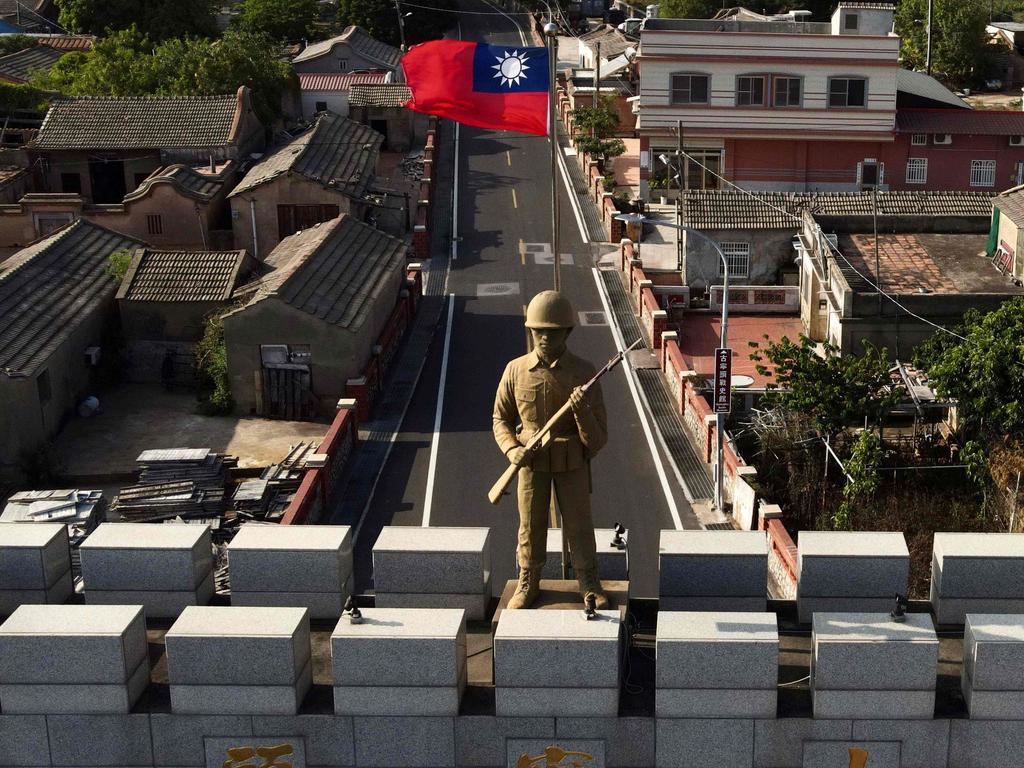China deploys fighter jets in South China Sea escalating Taiwan conflict
China has deployed fighter jets in the disputed South China Sea, prompting a furious military response from one of its bitter enemies.
China has launched eight fighter aircraft into the southwestern part of its air defence identification zone, with Taiwan engaging its air force in response.
The Taiwanese Defence Ministry reported that four Chinese J-16s, four JH-7s and an electronic warfare aircraft were seen flying in the South China Sea near the Taiwan-controlled Pratas Islands. In response, the ministry has issued “radio warnings” and deployed their air defence missile systems to “monitor the activity”. China has yet to comment on the actions of its aircraft.
RELATED: China threatening new ‘severe crisis’
RELATED: China’s brutal plan to ‘break’ rival
This comes as tensions worsen between the global superpower and the 25 million-strong island nation. China’s increased military activity around the self-governed country is believed to be in response to Taiwan announcing a new defence Minister and intelligence chief, placing Chiu Kuo-cheng, a graduate of the US Army War College, as their new National Security Bureau Director-General. In recent months, President Tsai Ing-wen has also made a move to boost Taiwan’s defence capabilities, including an improved weapons-design ability, as well as launching an advanced, missile-laden warship and commissioning a new mine-layer.

A COMPLICATED HISTORY
Historically, the relationship between China and Taiwan has been precarious. Officially known as the Republic of China (ROC), Taiwan has been governed separately from China since 1949, however the People’s Republic of China (PRC) still regards the island nation as a province of the mainland.
Despite this calls for Taiwan’s independence have been growing, with the country boasting its own constitution and democratically-elected leaders. It’s worth noting that President Tsai – who leads the Democratic Progressive Party (DPP) – also supports the country’s independence from China.
The PRC, however, is highly resistant to Taiwan’s independence. Last month China’s defence ministry spokesman Wu Qian defended the country’s decision to fly warplanes near the island as “necessary actions to address the current security situation” and “safeguard national sovereignty and security”.
“They are a solemn response to external interference and provocations by ‘Taiwan independence’ forces,” he said
“We warn those ‘Taiwan independence’ elements – those who play with fire will burn themselves, and Taiwan independence means war.”
THE US FACTOR
Taiwan’s continued support from the United States has also increased geopolitical anxieties. Recently, the Council on Foreign Relations’ (CFR) annual Preventive Priorities Survey escalating the battle between the US and China over Taiwan to a “top-tier conflict,” the first in the survey’s 13-year history.
The report highlighted fears that an armed military confrontation could occur in the South China Sea – where Taiwan is located. In January 2021, the US released a declassified White House document which shared their support to defend Taiwan if the country were to be attacked by China.
“The United States has a long history of fighting back against repressive regimes on behalf of those who value freedom and openness,” said National Security Adviser Robert O’Brien.
“As the world’s largest economy, with the strongest military and a vibrant democracy, it is incumbent on the United States to lead from the front.”
Official communications from the US State Department have also chided Beijing for its “ongoing attempts to intimidate … Taiwan,” with spokesman for the department saying that US’ backing of Taiwan was “rock solid”.
“We urge Beijing to cease its military, diplomatic, and economic pressure against Taiwan and instead engage in meaningful dialogue with Taiwan’s democratically elected representatives,” he said.
We sincerely thank @StateDept for its rock-solid support of democratic #Taiwan🇹🇼 in the face of Beijing's ongoing coercion. Based on shared values & interests, we're committed to our partnership with the #US🇺🇸 in furthering peace & stability in the #IndoPacific. https://t.co/70kmo2E4n3
— 外交部 Ministry of Foreign Affairs, ROC (Taiwan) 🇹🇼 (@MOFA_Taiwan) January 24, 2021
HOW DOES THIS IMPACT AUSTRALIA?
And while the Preventive Priorities report stated that the likelihood of a clash is lower “this year than in 2020,” any possibly conflict could leave Australia exposed. As a well-documented ally of the US, Australia’s involvement in a potential conflict is high.
Previously speaking to news.com.au, Justin Hastings, a professor in International Relations at the University of Sydney said that the “rapidly” changing and unpredictable tensions between China and Taiwan is cause for concern. In the event of an armed conflict, he said that Australia would like support the US indirectly and potential serve as a “launching point” for American troops and weapons”.
“A military attack against Taiwan would not be in Australia’s interests – it would be a stark problem for Australia and would almost certainly shut down a route through the South China Sea,” he said.



